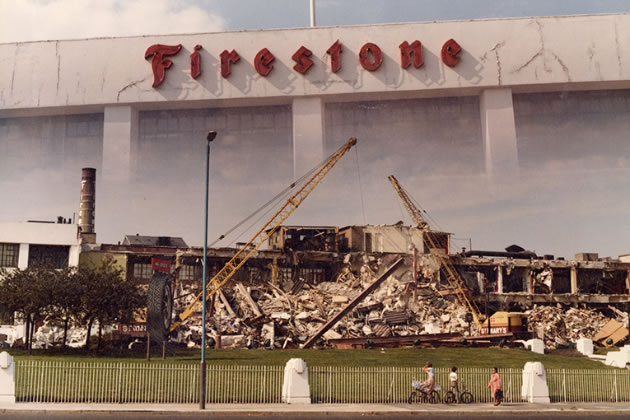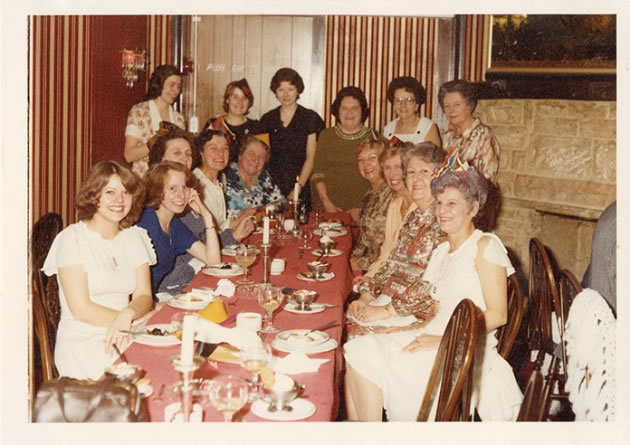New Online Exhibition on the Golden Mile Launched
Gunnersbury Park Museum takes a look at the area's industrial past

The destruction of the Firestone building marked the end of an era
|
December 4, 2023
Temples of Industry: How the Decline of Heavy Industry Shaped West London is a new online exhibition that has just been launched by Gunnersbury Park Museum.
It takes a look at the decline of the manufacturing industry along the Great West Road in the latter part of the 20th century.
Only a few decades earlier, the West London landscape was transformed with industries setting up along the ‘Golden Mile’ with modern and eye-catching buildings, designed to help promote and advertise their products. They included well-known brands such as Trico windscreen wipers, Pyrene fire extinguishers, Jantzen American swimwear, Gillette and Coty. Land which was previously rural was used for the factory sites. A brand-new electricity plant as well as easy transportation access encouraged development.
Sally Groves, Trico employee said, “We were surrounded by factories in those days, I mean the Great West Road was still almost the Golden Mile, factories - all there. There was factories all round Ealing... Park Royal, all these estates, Southall, Brentford”.
Although each factory went through changes and the workers faced various challenges, for half a century manufacturing boomed. However, this was not to last and the 1980s and 1990s saw a steady decline with many of the factories closing.
Gunnersbury Park Museum has been working to record the memories and mementoes from former employees at three local factories: A.E.C Southall, Trico Folberth and Firestone on the Great West Road. These are featured in the online exhibition alongside archive footage and photographs.
Along with the decline on industry, the exhibition also explores working conditions in the factories, the controversial demolition of the Firestone Factory and the Trico Equal Pay Strike, which is the longest successful strike for equal pay.

An office party at the Trico factory
Gunnersbury Park Museum is continuing its work to record the memories and stories from people who worked in the local factories between 1970 – 1990. Email collections@visitgunnersbury.org if you want to get involved in the project.
Ellie Djerir, Head of Heritage & Museum Services at Gunnersbury Park Museum said: “We are thrilled to have been able to bring this project to life, thanks to Everyday Heritage funding from Historic England. The team have been able to add objects, stories and archive material to Gunnersbury’s ‘Great West Road’ collections, giving us a clearer picture of how the decline of manufacturing industry in the area impacted people and communities. The project also gave us the opportunity to work with our neighbours Protégé and we’d like to thank the young people involved for their creativity, thoughtfulness and skill in making their excellent film on this subject. This work is far from over – we are still looking to hear from people who worked in local factories during the 1970s – 1990s and intend to continue to update the online exhibition as we discover more stories.”
Sean Curran, Head of Inclusion, Historic England said “Historic England’s Everyday Heritage Grants: Celebrating Working Class Histories are aimed at unlocking the stories that help bring our local places to life through creative and community driven projects. Our country’s heritage is at its most vibrant when the communities of those places have the agency to tell their stories in their own ways, and Temples of Industry is a great example of how people’s pride of place can be enriched through uncovering everyday stories of extraordinary people and places.”
To view the exhibition for free click here.
The exhibition is supported by a grant from Historic England’s ‘Everyday Heritage’ fund.
Like Reading Articles Like This? Help Us Produce More This site remains committed to providing local community news and public interest journalism. Articles such as the one above are integral to what we do. We aim to feature as much as possible on local societies, charities based in the area, fundraising efforts by residents, community-based initiatives and even helping people find missing pets. We've always done that and won't be changing, in fact we'd like to do more. However, the readership that these stories generates is often below that needed to cover the cost of producing them. Our financial resources are limited and the local media environment is intensely competitive so there is a constraint on what we can do. We are therefore asking our readers to consider offering financial support to these efforts. Any money given will help support community and public interest news and the expansion of our coverage in this area. A suggested monthly payment is £8 but we would be grateful for any amount for instance if you think this site offers the equivalent value of a subscription to a daily printed newspaper you may wish to consider £20 per month. If neither of these amounts is suitable for you then contact info@neighbournet.com and we can set up an alternative. All payments are made through a secure web site. One-off donations are also appreciated. Choose The Amount You Wish To Contribute. If you do support us in this way we'd be interested to hear what kind of articles you would like to see more of on the site – send your suggestions to the editor. For businesses we offer the chance to be a corporate sponsor of community content on the site. For £30 plus VAT per month you will be the designated sponsor of at least one article a month with your logo appearing if supplied. If there is a specific community group or initiative you'd like to support we can make sure your sponsorship is featured on related content for a one off payment of £50 plus VAT. All payments are made through a secure web site. |